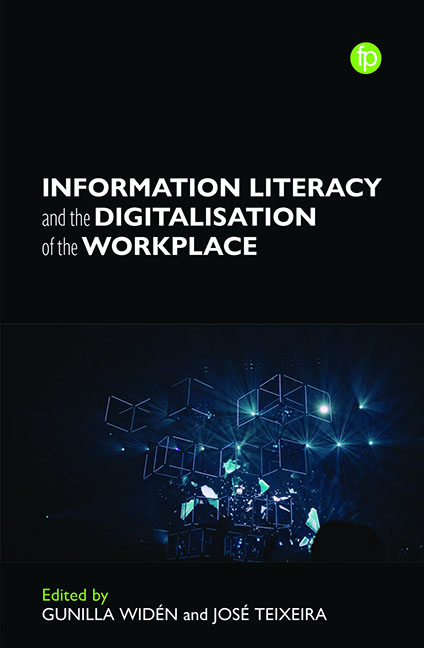Book contents
- Frontmatter
- Contents
- Figures and Tables
- Contributors
- Introduction: Advancing Theory on Workplace Information Literacy
- 1 Literature Review: In Search of the Many Meanings of Information Literacy
- 2 Digital Literacy in a Post-Digital Era: Rethinking ‘Literacy’ as Sociomaterial Practice
- 3 Methodological Choices of Information Literacy in the Workplace: Qualitative, Quantitative or Mixed-Methods?
- 4 Investigating Information Seeking and Information Sharing Using Digital Trace Data
- 5 Making Do With Limited Transparency of Sensitive Information in Secretive Organisations: Collective Information Literacy Through Hinting
- 6 Information Literacy Competencies for Career Transitions in the Digital Age
- 7 The Importance of Information Literacy for Work Satisfaction in a World-Wide-Workplace Context
- 8 Entrepreneurs’ Digital Information Sources Selection: A Perspective on the Impact of Information Literacy and Generational Differences
- 9 Conclusion: Workplace Information Literacy as the Literacy of the Digital Workplace
- Index
6 - Information Literacy Competencies for Career Transitions in the Digital Age
Published online by Cambridge University Press: 17 December 2023
- Frontmatter
- Contents
- Figures and Tables
- Contributors
- Introduction: Advancing Theory on Workplace Information Literacy
- 1 Literature Review: In Search of the Many Meanings of Information Literacy
- 2 Digital Literacy in a Post-Digital Era: Rethinking ‘Literacy’ as Sociomaterial Practice
- 3 Methodological Choices of Information Literacy in the Workplace: Qualitative, Quantitative or Mixed-Methods?
- 4 Investigating Information Seeking and Information Sharing Using Digital Trace Data
- 5 Making Do With Limited Transparency of Sensitive Information in Secretive Organisations: Collective Information Literacy Through Hinting
- 6 Information Literacy Competencies for Career Transitions in the Digital Age
- 7 The Importance of Information Literacy for Work Satisfaction in a World-Wide-Workplace Context
- 8 Entrepreneurs’ Digital Information Sources Selection: A Perspective on the Impact of Information Literacy and Generational Differences
- 9 Conclusion: Workplace Information Literacy as the Literacy of the Digital Workplace
- Index
Summary
Introduction
The digitalisation of society is an issue subject to scholarly attention (for example, Tsekeris, 2018; Valenduc and Vendramin, 2017, 2–4), particularly in respect of its reshaping of economic, political and cultural landscapes, including the transformation of work (for example, Toven-Lindsey, 2017). It is now possible to delegate decision-making for workplace practices such as hiring, training and on-boarding to non-human entities and ‘algorithmic bosses’ and work placements can be reconfigured into an online format (Beer, 2017; Duffy, 2020, 103; de Haas et al., 2020). While workplaces are subject to continuous change and pressure to innovate (Oeij et al., 2019), automation and alterations to the spatiotemporal organisation of labour also impact individual work experiences (Hoskyn et al., 2020; Kingma, 2019; Gill, 2020, 146).
In addition to the challenges associated with working within such an environment, many workers face considerable job precarity: an increased experience of inequality and insecurity accompanied by the destabilisation of institutions (Kwon and Lane, 2016, 10). Job precarity has grown steadily since the 2008 financial crisis and has led to the development of multiple anti-precarity agendas that call for an improvement of working conditions through trade union and government engagement (Paret, 2016, 111). When employers no longer offer job stability and/or vertical progression opportunities to their employees, working trajectories can become disassociated from the identification of a single career for life (Rodrigues and Guest, 2010). Thus, individuals need to be prepared to navigate a number of career transitions across their working lifespan (Bezanson, Hopkins and Neault, 2016; Lyons, Schweitzer and Ng, 2015; Todolí-Signes, 2017).
Attitudes to work are also changing in ways that may prompt voluntary career mobility and necessitate an increased preparedness for managing changeable career pathways. In pursuit of a better work-life balance, greater job satisfaction and career advancement opportunities, many workers seek more fulfilling work (for example, Chan et al., 2020; Kidd, 2008). This trend has been especially pronounced in recent years. For example, the COVID-19 pandemic has prompted a global phenomenon known as ‘the great resignation’, whereby large numbers of workers resign from their jobs in protest at poor working conditions (Sheather and Slattery, 2021, 1).
- Type
- Chapter
- Information
- Information Literacy and the Digitalisation of the Workplace , pp. 71 - 100Publisher: FacetPrint publication year: 2023

